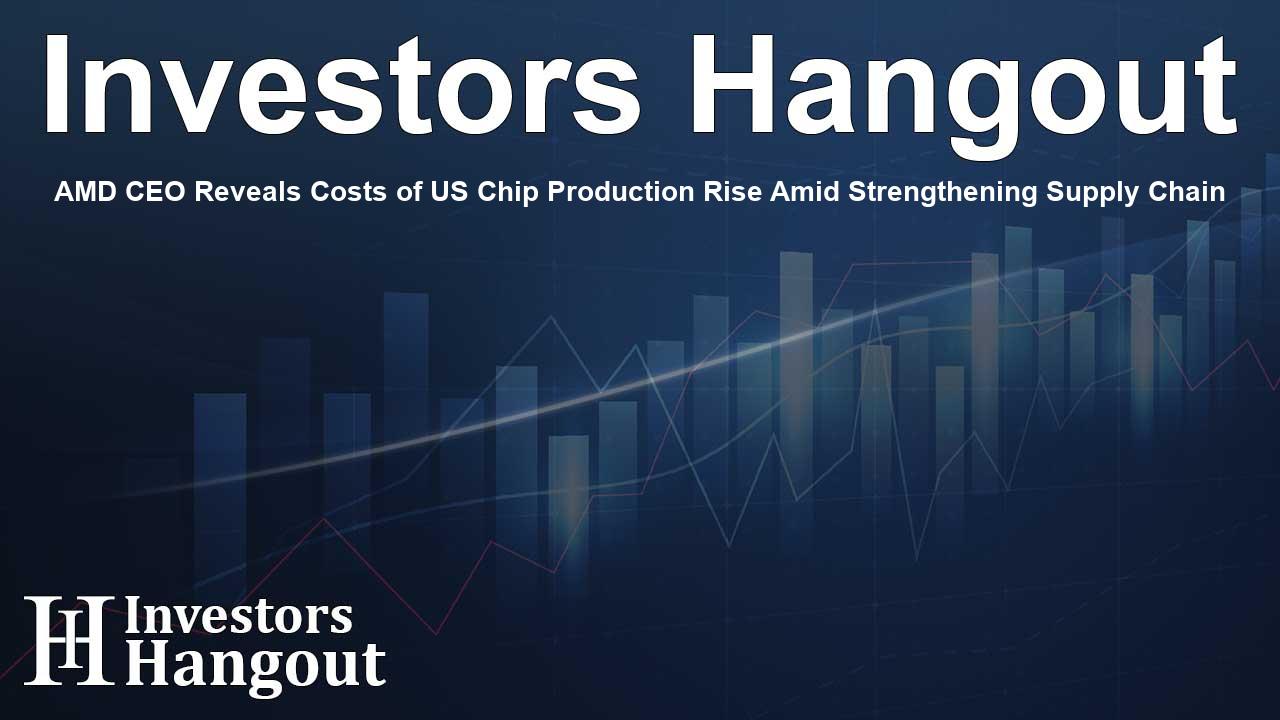AMD CEO Reveals Costs of US Chip Production Rise Amid Strengthening Supply Chain

AMD's CEO Discusses Rising Costs of Domestic Chip Production
In an important announcement within the semiconductor industry, Advanced Micro Devices (AMD) CEO Lisa Su stressed that the production costs for chips made in the U.S. are significantly higher than those manufactured in Taiwan. Addressing an AI-focused forum, Su revealed that chips produced by Taiwan Semiconductor Manufacturing Co. in Arizona come with a premium of 5% to 20% more compared to their Taiwan counterparts.
Background on U.S. Manufacturing
This shift towards domestic manufacturing is largely driven by the U.S. government's initiative to enhance national security and supply chain resilience. Both the Trump and Biden administrations have laid emphasis on the need for critical semiconductor manufacturing capabilities to be transferred to the homeland, including advanced chip packaging processes. This aligns with their goals to bolster U.S. semiconductor leadership.
Taiwan Semiconductor's Investments in Arizona
In response to these governmental pressures, Taiwan Semiconductor has committed over $65 billion to enhance its manufacturing facilities in Arizona. Additionally, they are contemplating investments totaling up to $100 billion in U.S. chip manufacturing projects over the next few years.
Strategic Value Amid Rising Costs
Despite the higher costs associated with U.S.-manufactured chips, Su pointed out the strategic significance of these investments for AMD's supply chain. In a recent interview with a major news outlet, Su emphasized that this strategic move substantially strengthens AMD’s manufacturing capabilities and production reliability.
Quality of U.S. Semiconductor Production
According to Su, the Arizona plant has already achieved production yields on par with their Taiwanese factories, indicating that the efficiency and quality of production are consistent. The first batch of chips from this facility is expected to arrive by year's end, marking an important milestone for AMD.
Event Highlights and Political Support
This announcement was made during the Hill and Valley Forum, a noteworthy event gathering technology executives and lawmakers, alongside former President Trump and officials promoting a newly introduced AI Action Plan. This plan aims to elevate U.S. innovation, particularly in artificial intelligence.
Market Trends and Competitive Landscape
In recent concerns regarding the semiconductor market dynamics, AMD faces competition from other industry leaders like Nvidia (NVDA). Recently, there have been some relaxations in the U.S. export restrictions regarding AI accelerators sold to China. However, uncertainties still loom over the number of licenses and the duration of permitting these shipments, as China represents a significant market for semiconductors.
The Demand for AI Chips
Su reiterated the surging demand for AI chips, fueled by substantial investments from tech leaders such as Sam Altman of OpenAI and Elon Musk of xAI, showing a strong continuous interest in AI technology which inevitably drives semiconductor needs.
Stock Market Performance Snapshot
As of recent market evaluations, AMD shares have increased by more than 31% year-to-date. Comparatively, Taiwan Semiconductor stock has gained around 22%. The PHLX Semiconductor Index, which encompasses both companies, indicates an uptick of over 13% during this period.
Price Actions and Market Updates
Currently, AMD stock is trading at $160.70, up by 1.29% in pre-market trading, while Taiwan Semiconductor’s stock has seen a modest increase of 0.47%. These movements reflect ongoing investor confidence in AMD’s strategic direction.
Frequently Asked Questions
What are the reasons for the increased cost of U.S. chips?
The rise in costs is attributed to the significant investments required for domestic manufacturing, along with the push from the government for national security and supply chain resilience.
How does U.S. semiconductor manufacturing quality compare to Taiwan?
AMD's CEO claims that quality from the Arizona facility matches that of Taiwan, showing successful production yields the same as those in Taiwan factories.
What investments has Taiwan Semiconductor made in the U.S.?
Taiwan Semiconductor has invested over $65 billion in Arizona and is considering an additional $100 billion in future projects to enhance chip manufacturing capabilities.
How have AMD and Taiwan Semiconductor stocks performed in the market?
AMD's stock has risen over 31% year-to-date, while Taiwan Semiconductor has seen a 22% increase. Both stocks are reflective of the broader PHLX Semiconductor Index performance.
What are the implications of U.S. export restrictions on AI chips?
Recent easing of export restrictions has provided some relief, but uncertainty remains about the licensing process for shipping AI technologies to China, which is a critical market for semiconductor sales.
About The Author
Contact Olivia Taylor privately here. Or send an email with ATTN: Olivia Taylor as the subject to contact@investorshangout.com.
About Investors Hangout
Investors Hangout is a leading online stock forum for financial discussion and learning, offering a wide range of free tools and resources. It draws in traders of all levels, who exchange market knowledge, investigate trading tactics, and keep an eye on industry developments in real time. Featuring financial articles, stock message boards, quotes, charts, company profiles, and live news updates. Through cooperative learning and a wealth of informational resources, it helps users from novices creating their first portfolios to experts honing their techniques. Join Investors Hangout today: https://investorshangout.com/
The content of this article is based on factual, publicly available information and does not represent legal, financial, or investment advice. Investors Hangout does not offer financial advice, and the author is not a licensed financial advisor. Consult a qualified advisor before making any financial or investment decisions based on this article. This article should not be considered advice to purchase, sell, or hold any securities or other investments. If any of the material provided here is inaccurate, please contact us for corrections.
